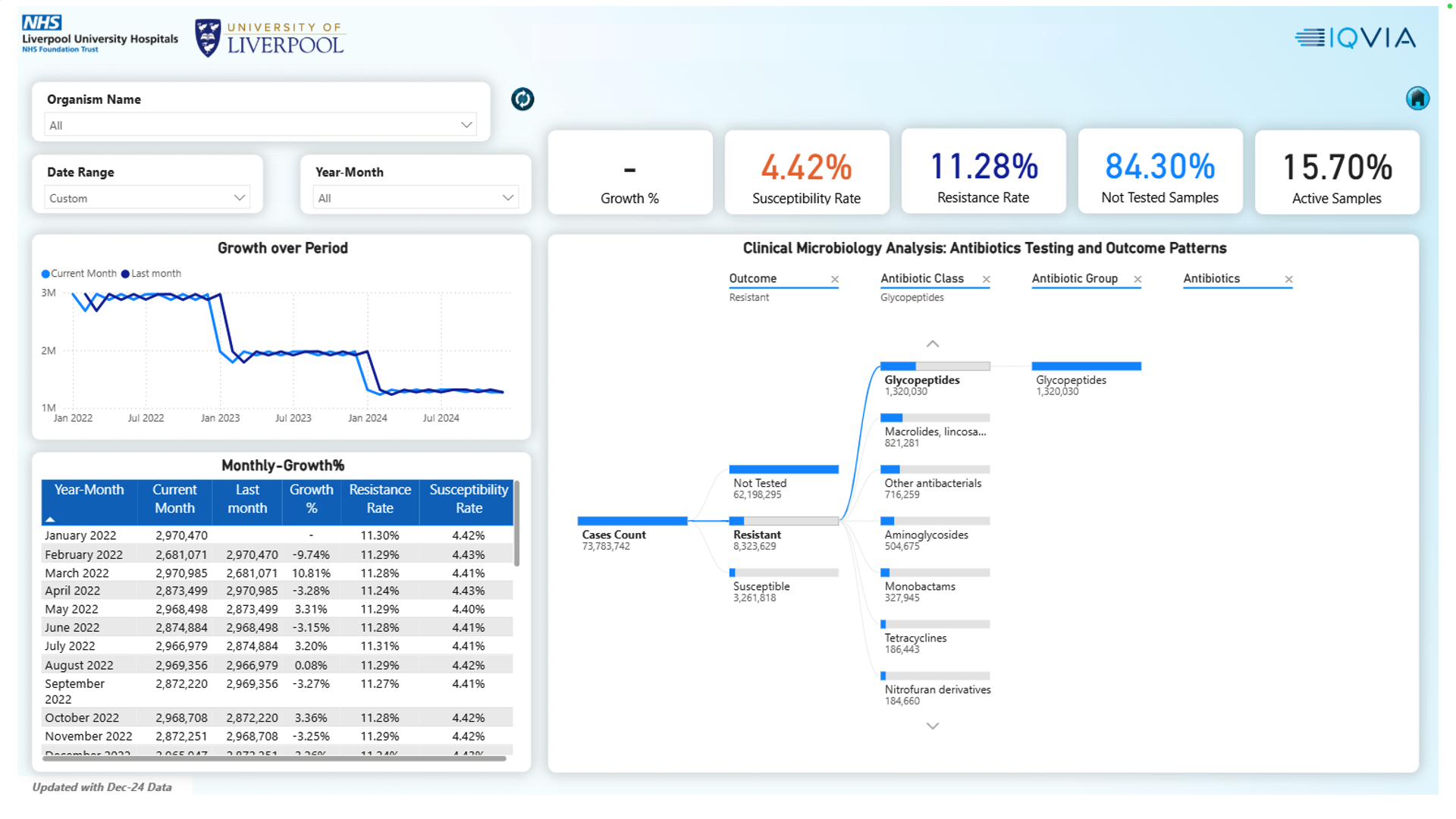IQVIA Real World Solutions is the proven partner life science companies trust to take on their complex evidence challenges. We enable our customers to generate and disseminate real world evidence to answer crucial questions and meet the needs of their stakeholders.




- Locations
- United Kingdom
- Enhancing Antimicrobial Stewardship through Data-Driven Approaches
Antimicrobial resistance (AMR) is one of the most pressing global health challenges of our time1. Tackling it requires more than awareness: it demands collaboration, innovation, and action.
To demonstrate the power of professional partnership between the public and private sectors during AMR Awareness week 2025, we want to highlight how uniting a critical mass of data, technology, advanced analytics and people can catalyse innovative, solutions and scalable initiatives in the fight against AMR in the UK. One such collaboration is the AMR-X Programme2,3 , a partnership between IQVIA and the University of Liverpool, funded by the Office for Life Sciences (OLS). The partners have worked together to equip local antimicrobial stewards with new technology to optimise prescribing decisions in near real time, thereby enhancing current decision-making processes and safeguarding NHS patients and indeed the future effectiveness of antimicrobials.
The Challenge of AMR: Why timely, high-quality data and algorithms matter
AMR is escalating globally, threatening patient safety and healthcare outcomes. In the UK, data for England shows a 13.1% increase in cases of bloodstream infections resistant to one or more critically important antibiotics between 2020 and 20244. Static prescribing guidance, outdated formularies, and high clinical workloads are increasingly unable to match the rapid progression of antimicrobial resistance patterns. To effectively address these issues, the NHS and clinicians within local healthcare systems require timely, high-quality data that accurately represent the real-world dynamics of antimicrobial resistance.
Collaboration and Innovation: Dynamic solutions incorporating real-world data can improve antimicrobial stewardship
Innovation in antimicrobial stewardship needs collaboration between clinicians, researchers, scientists, and technology partners. The AMR-Now Formulary, a real-time adaptive antimicrobial formulary, developed by IQVIA in partnership with the University of Liverpool, exemplifies this approach. The AMR-Now Formulary streamlines the clinical workflow for updating local traditional formularies by integrating local resistance patterns directly into the approval and distribution process. Antibiotic stewardship teams will be able to review, update, and distribute formularies more rapidly, enabling proactive and accelerated responses to emerging resistance and improving patient safety and outcomes.
 Fig. 1: AMR-Now Formulary Dashboard
Fig. 1: AMR-Now Formulary Dashboard
A Senior Consultant Microbiologist at Liverpool Trust Hospitals highlighted the impact of the dynamic Antimicrobial Formulary on clinicians, patients and health system saying:
"This is the first of its kind in the UK, and goes beyond what any hospital has currently. The product expansion and use cases are limitless with huge clinical and patient impact."
A System-Wide Solution: Three levels of impact and scaling adoption
AMR is a system-wide challenge, with the most severe consequences of AMR managed in hospitals. The best antimicrobial stewardship needs data-driven learning systems working at three levels:
1. Patients – enabling expectations and ensure proper use of antimicrobials
2. Practitioners – follow up-to-date guidance and prescribe accordingly
3. Populations – surveillance of resistance and intelligent targeting of resources to optimise stewardship and strengthen infection prevention, control, and care
IQVIA’s collaboration with the University of Liverpool demonstrates how academic and commercial real-world expertise, combined with digital innovation can deliver impact in the fight against AMR to protect patients and the future of antimicrobials.
The challenge ahead is to now ensure innovative developments such as the AMR-Now Formulary are scaled to support its’ adoption across the NHS. To realise this potential and enable widespread impact, dedicated funding and streamlined innovation adoption pathways will be required. Local implementation and adoption of such technological advances is the responsibility of all across the NHS. Complacency, thinking time is on our side, and failure to adopt such technology to support overstretched health systems will be the fuel that feeds AMR.
AMR is not a future problem – it is an urgent crisis. Through global cooperation and strategic action, we can preserve the effectiveness of life-saving medicines and protect the health of future generations.
For further reading, see:
- National-Grid-of-Civic-Learning-Systems-NHSA-and-partners.pdf
- Antimicrobial learning systems: an implementation blueprint for artificial intelligence to tackle antimicrobial resistance
- IQVIA White Paper: National Ownership of Antibiotic Access and Use: Driving Policy Decision Making Based on Population Needs
References:
- Naghavi, Mohsen et al. Global burden of bacterial antimicrobial resistance 1990–2021: a systematic analysis with forecasts to 2050. The Lancet, Volume 404, Issue 10459, 1199 – 122
- Howard et al. Antimicrobial learning systems: an implementation blueprint for artificial intelligence to tackle antimicrobial resistance. The Lancet Digital Health, Volume 6, Issue 1, e79 - e86. www.doi.org/10.1016/S2589-7500(23)00221-2
- AMR-X Collaborators. System-wide approaches to antimicrobial therapy and antimicrobial resistance in the UK: the AMR-X framework. Lancet Microbe. 2024 May;5(5):e500-e507. www.doi.org/10.1016/S2666-5247(24)00003-X.
- ESPAUR Report 2024 - 2025 https://www.gov.uk/government/publications/english-surveillance-programme-antimicrobial-utilisation-and-resistance-espaur-report
- World Health Organisation - https://cdn.who.int/media/docs/default-source/antimicrobial-resistance/amr-gcp-asa/global-call-to-action-to-address-amr---oct-2025.pdf

